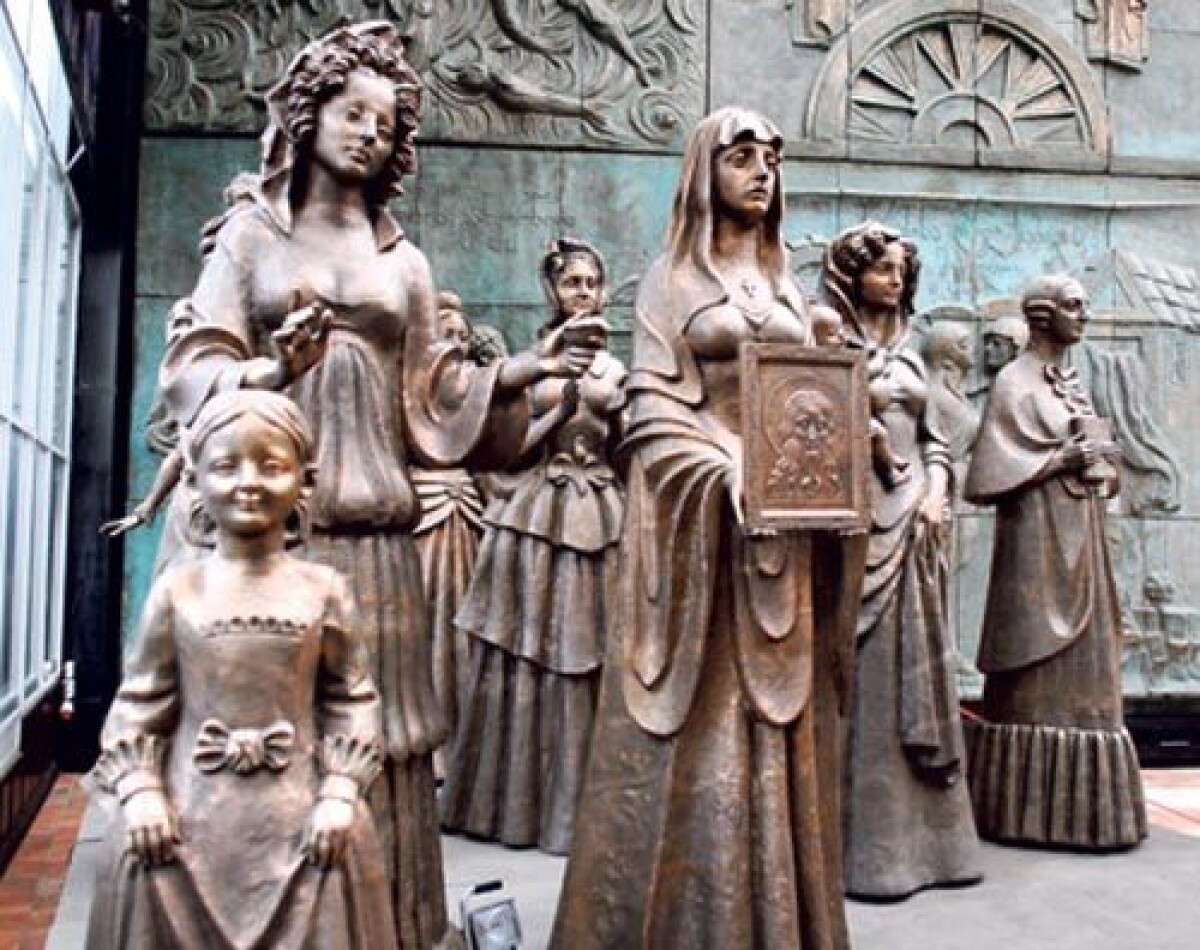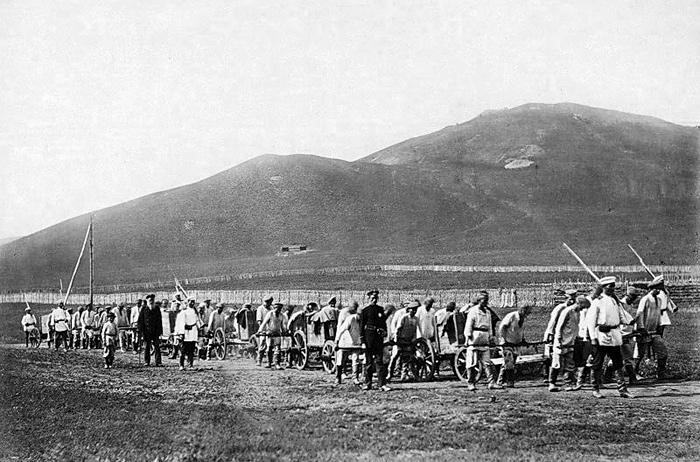
For the second century people are worried about the fate of the wives of the Decembrists. They are sung in poetry by Pushkin, Odoyevsky, Nekrasov, in painting - by Bestuzhev. They are admired, they bow before them. According to many people who lived in those years
"They were angels sent by the sky to support, comfort and strengthen not only their husbands, but also all of us on a difficult and thorny path."
At the end of the XIX century there were many heroic Kazakh sons fighting for justice. They were shot without trial and investigation, hung, driven to the stage in Siberia. Saltybai Turganov was one of those who remained in the memory of the people.
A little more than a year passed since he married to Sandibala Zharylgapkyzy. Saltybai was exiled to Siberia. He was shackled, like "A rebel giving a bad example" goes to Siberia for twelve years.
"My only dream is to be your faithful wife until the end"
with such words with a bag on her shoulders Sandibala will follow her husband. First she went to Aulie Ata (now Taraz), Merke, and then to Siberia. She does not lag behind the column of convicts. In the December cold, wounded by shackles, frostbitten prisoners were driven to Irkutsk prison. The prison after such a painful road seemed to them a home.
Sandibala managed to find a common language with the residents of Irkutsk: to someone she brought firewood, to others - water, earning it for a living. Often and long she stood at the door of the prison, waiting for a short meeting with her husband. Everything that she earned spent on him. So will be the first six months.
In prison there was specific order. Arrestees had numbers. Their names were not pronounced. An order came, and they were sent to another camp. Upon learning of this, Sandibala also prepared for the journey. From Irkutsk, the column moved up the Lena River to Verkhoyansk. Due to severe frost and malnutrition, the prisoners died on the way. About three months later they reached the Bodai gold deposit. At the request of the prisoners, Sandibala received permission to support her husband, who had weakened for a long journey. He frostbite his feet. The feet had to be amputated. Now he moved, leaning on the sticks. So she would live near with condemned. Not thinking about herself she made every effort to help her husband, to ease his heavy share.
The long-awaited 12 years of hard labor are over. And in 1915 Saltybai was released from prison and returned home, to his homeland. The stage, originally consisting of 60 people, was very thin; the survivors could be counted on the fingers. Among them was Saltybai, who survived thanks to the love and care of his wife Sandibala. He was the happiest person in the world, when from the top of his native Shokpar glanced at the Chu valley.
So love helped to survive, and safely return "from the depths of the Siberian ore." They started a new life. Sandibala herself died before the war, in 1940.

The Annenkovs, Ivanovs.
Familiarity with the fate of the wives of the Decembrists is enough to learn not only about their lives, but their influence on Kazakhstan and that the descendants of the famous Decembrists live in Almaty.
Among the women who dare to share the fate of their husband, was Polina Geble. Ivan Aleksandrovich Annenkov, lieutenant of the cavalry regiment, a member of the Northern Decembrist Society, convicted according to the rank, along with other comrades, was detained since 1827 in the Chita casemate. According to the famous historian M.I. Semevsky, this "perfectly educated, calm, noble character, handsome in the full sense of the word, not only physically, but also a morally and intellectually worthy representative of the brilliant society of guards officers" was hard to survive his hard, precarious and humiliating position and a long separation from his bride and fell into despondency. Annenkov was firmly convinced that his beloved - the resolute, smart Polina Geble would not leave him in trouble and would come to him without fail.
The very Polina, to come to Siberia, was necessary to overcome many different formalities. She was French, not Russian, and therefore "could not use the established rules allowing wives to follow their exiled husbands."
Polina Geble personally appealed to the tsar to allow her to go to Siberia and share the exile of her civil husband.
"I completely sacrifice myself to a person, without which I can not continue to live. This is my most ardent desire. Please, sir, open your high soul to compassion, graciously allowing me to share his exile. I will renounce my fatherland and am ready to submit completely to your laws."
Without yielding to any kind of persuasion and agreeing to become the "wife of a convict", she begs for herself the highest resolution.
And in March 1825 Polina, after other Decembrists, will arrive at the place of Annenkov’s exile. How he was immensely pleased. Soon they were married in the Chita church. And then the most unusual wedding took place. At the time of the wedding with Annenkov removed the shackles and immediately after the ceremony again put on and taken to prison. They will have 18 children, of whom only six will survive the amnesty: three sons and three daughters.
The fate of Olga Annenkova, like other children of the Decembrists born in Siberian exile, was peculiar. The children of the Decembrists were called "unhappy victims of unreasonable love", condemning the wives of the Decembrists, women who threw everything: nobility, wealth, connections and relatives. Of course, Olga, like all children who had come into Decembrist families, had to go through all the difficulties of penal servitude that fell to the lot of their parents. But the children were surrounded by warmth and care: they were nursed, taught and educated by the Decembrists, that they remembered these years as the best in their life.
In her memoirs Olga Annenkova writes:
"Panov constantly told me fables and even found for me the first edition of Krylov's fables. From him I learned the first tales: "Little Red Riding Hood", "Sleeping Princess", etc. As I was small, I did not like spots on myself, and one day I cried bitterly, because I got soiled. Peter Nikolaevich Svistunov had the patience to hold me on his knees and comfort me until I calmed down. Another time when I was very ill and put a fly on my chest, Dr. Wolf and Artamon Zakharovich Muraviev did not leave me and at night succeeded each other."
And only a marriage with a young officer, Konstantin Ivanov, will finally give her the opportunity to acquire a full social status of the daughter of a "state criminal". Until the same time, even children were not allowed to leave the place where the parents settled.
Omsk educated society will hospitably accept the Ivanov family. The first meeting between Chokan Valikhanov and Dostoevsky will take place in the house of Olga Annenkova and will become the defining one in his future life.
The prolonged expulsion of the Decembrists came to an end. Already their grown-up children, born in local casemates, began to move gradually to central Russia. In connection with the promotion of her husband and his transfer to Petersburg in the summer of 1854, Olga Ivanovna also had to move and leave Siberia. Of course, she was glad of this, although it was a pity to leave the land where she was born and grew up and where her parents continued to live, who were waiting for an amnesty.
The fate of the children of the noble revolutionaries who opposed the autocracy is unusual. They did not become participants in any speeches, but the memory of the Decembrists kept their whole lives.
"It is known to many who were already Decembrists, with what dignity they transferred their position, what exemplary, impeccable life they led first in hard labor, and then in the settlement scattered all over Siberia, and how they were loved and respected wherever their fate threw them. Personally for me, they were indispensable, I then searched for them everywhere, I missed them in life, when on my marriage I moved to Russia. And it's easy to understand when you remember that during the whole period of their exile, even during the settlement, when thousands of miles separated them, the Decembrists were like one family, closely connected with each other by common interests and the most holy friendship"
will write in her memoirs Olga Annenkova.
For various reasons, some of Annenkov's children and grandchildren went abroad; part of the family's archive was outside of Russia, in particular in France - in the homeland of Polina Geble. Documents and letters from their family archives of E.I. Trubetskaya and P.E. Annenkova published in Paris, in two books. After the war, writer Konstantin Simonov, who returned from a trip to America, brought with him memoirs, which handed him the daughter of the former chairman of the Samara District Court, M.V. Annenkova.
Maria Vladimirovna, the daughter of the eldest son of I. Annenkov, gives details of her father's life in Samara in 1892-1893 and his meetings with judicial investigator Ya. L. Teitel with interesting young people.
"At Teitel's house my father met Maxim Gorky, who at that time was still an unknown young man, exiled to Samara for his liberal way of thinking. The young people who visited Teitel's house listened with interest to the father's stories about the Decembrists and Siberia. There was another young man visiting the house of Teitel, who was deeply interested in the history of the Decembrist uprising. He was not particularly large; all features of his face bore not only a vast mind, but also an unyielding energy. At that time he was an assistant to a sworn attorney, popular lawyer Hardin. His name was Vladimir Ilyich Ulyanov, later he became known to the world as Lenin."
Konstantin and Olga Ivanovs (Annenkova) had three children. Their elder daughter Natalia's great-grandchildren live in Almaty.
By Dina IGSATOVA
Translated by Raushan MAKHMETZHANOVA
Use of materials for publication, commercial use, or distribution requires written or oral permission from the Board of Editors or the author. Hyperlink to National Digital History portal is necessary. All rights reserved by the Law RK “On author’s rights and related rights”. To request authorization email to kaz.ehistory@gmail.com or call to (7172) 79 82 06 (ext.111).
